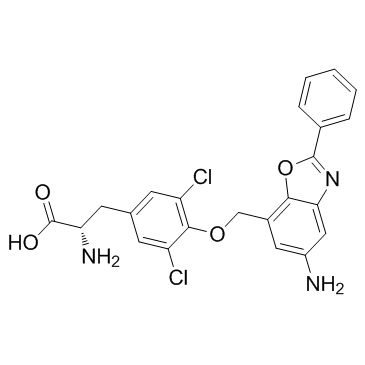All AbMole products are for research use only, cannot be used for human consumption.

In vitro: JPH203 completely and slightly inhibits the L-Leucine uptake in YD-38 cells (IC50 value: 0.79 μM) and NHOKs (IC50 value: >100 μM), respectively. JPH203 inhibits HT-29 cell growth, generating an apparent IC50 of 4.1 μM, but the JPH203 IC50 concentration (0.06 μM) needed to inhibit the L-Leucine uptake does not inhibit HT-29 cell growth, which represents a 68-fold difference in susceptibility. JPH203 activates the mitochondria-dependent apoptotic signaling pathway by upregulating pro-apoptotic factors, such as Bad, Bax, and Bak, and the active form of caspase-9, and downregulating anti-apoptotic factors, such as Bcl-2 and Bcl-xL in Saos2 human osteosarcoma cells. JPH203 can distinguish relative abundance between LAT1 and LAT2. It has high selectivity for LAT1. JPH203 is metabolically stable in mouse, rat, dog, monkey and human liver microsomal incubations. JPH203 induces both G2/M and G0/G1 cell cycle arrest, as well as reduces the S phase accompanied by altered expression of the proteins in cell cycle progression: cyclin D1, CDK4, and CDK6.
In vivo: Daily intravenous administration of JPH203 (12.5 and 25 mg/kg) significantly inhibits tumor growth in KKU-213 cholangiocarcinoma cell xenografts in the nude mice model in a dose-dependent manner with no statistically significant change in the animal’s body weight and with no differences in the histology and appearance of the internal organs compared with the control group. Thus, JPH203 shows anti-tumor efficacy in nude mice bearing human CCA cell xenografts without general toxicity.

Int J Mol Sci. 2022 Mar 26;23(7):3637.
Functional characterization of the solute carrier LAT-1 (SLC7A5/SLC2A3) in human brain capillary endothelial cells with rapid UPLC-MS/MS quantification of
JPH203 purchased from AbMole
| Cell Experiment | |
|---|---|
| Cell lines | Saos2 human osteosarcoma cells |
| Preparation method | Colony formation assays are performed by seeding 300 cells/well into 6 well plates. After 24 h of growth, the cells are treated with 100 µM JPH203 for 72 h. The JPH203 treatment is removed and fresh medium is added. The cells are incubated for 10 days. Thereafter, medium is removed and the cells are washed with phosphate buffered saline (PBS) and fixed with 4% paraformaldehyde for 10 min at 4℃. Sequentially, the colonies are stained with 2% crystal violet for 10 min. Finally, colonies stained by crystal violet are washed with PBS and dried at room temperature, before imaged by a digital camera. |
| Concentrations | 100 µM |
| Incubation time | 72 hours |
| Animal Experiment | |
|---|---|
| Animal models | Sprague-Dawley rats |
| Formulation | dissolved in DMSO and diluted in water |
| Dosages | 0.9-1.0 mg/kg |
| Administration | i.v. |
| Molecular Weight | 472.32 |
| Formula | C23H19Cl2N3O4 |
| CAS Number | 1037592-40-7 |
| Solubility (25°C) | 10 mM in DMSO |
| Storage |
Powder -20°C 3 years ; 4°C 2 years In solvent -80°C 6 months ; -20°C 1 month |
| Related Autophagy Products |
|---|
| Vacuolin-1
Vacuolin-1 is a cell-permeable inhibitor of Ca2+ dependent fusion of lysosomes to the cell membrane. Vacuolin-1 blocks the Ca2+-dependent exocytosis of lysosomes and prevents the release of lysosomal content without affecting the process of resealing. vacuolin‐1 is a potent and selective PIKfyve inhibitor and inhibits late‐stage autophagy by impairing lysosomal maturation. |
| CA77.1
CA77.1 is a potent, brain-penetrant and orally active chaperone-mediated autophagy (CMA) activator with favorable pharmacokinetics. |
| KAN0438757
KAN0438757 is a potent and selective inhibitor of the metabolic kinase PFKFB3 with an IC50 of 0.19 μM. |
| Metofenazate
Metofenazate is a selective calmodulin inhibitor. |
| Patulin
Patulin (Terinin) is a mycotoxin produced by a variety of fungi, causes chromosome breakage, mutation, teratogenic and cytotoxic. Patulin induces autophagy-dependent apoptosis through lysosomal-mitochondrial axis, and causes DNA damage. |
All AbMole products are for research use only, cannot be used for human consumption or veterinary use. We do not provide products or services to individuals. Please comply with the intended use and do not use AbMole products for any other purpose.


Products are for research use only. Not for human use. We do not sell to patients.
© Copyright 2010-2024 AbMole BioScience. All Rights Reserved.
